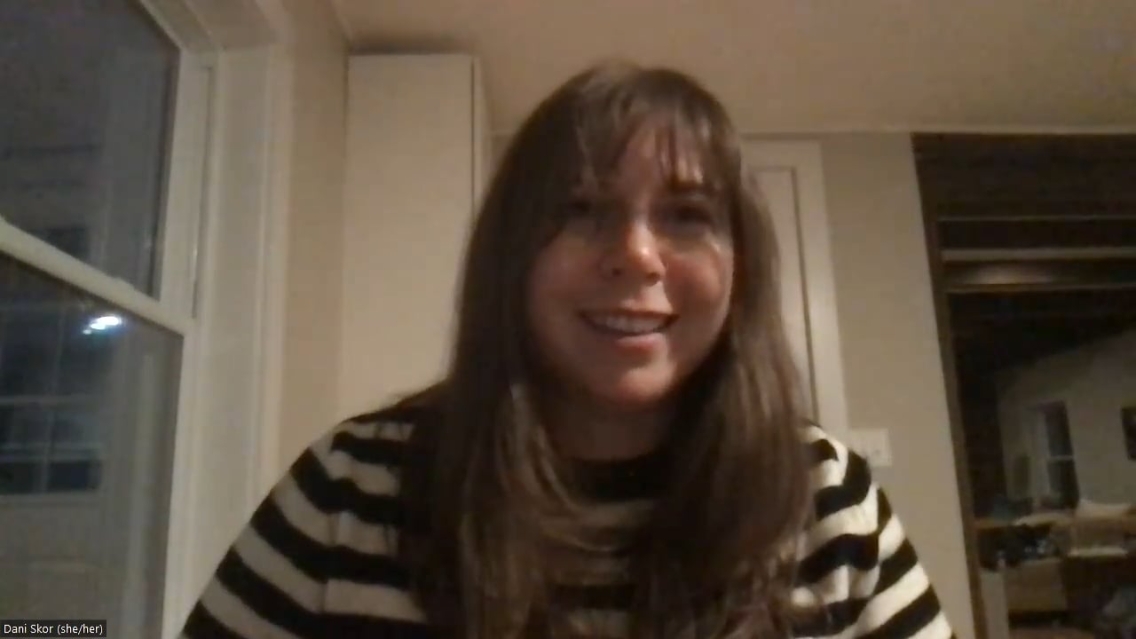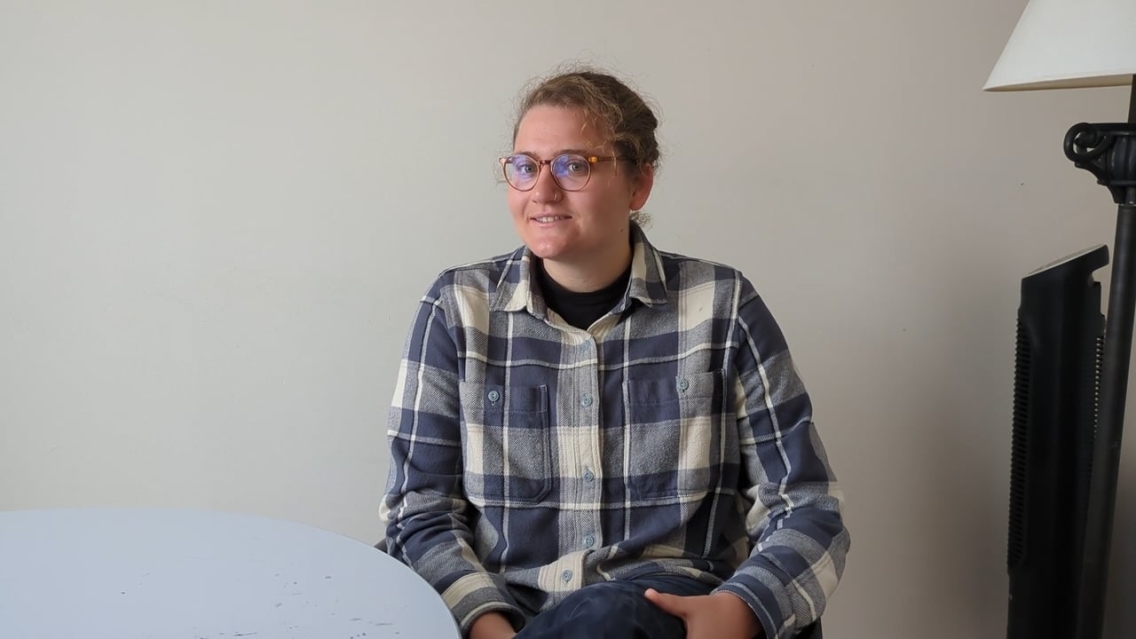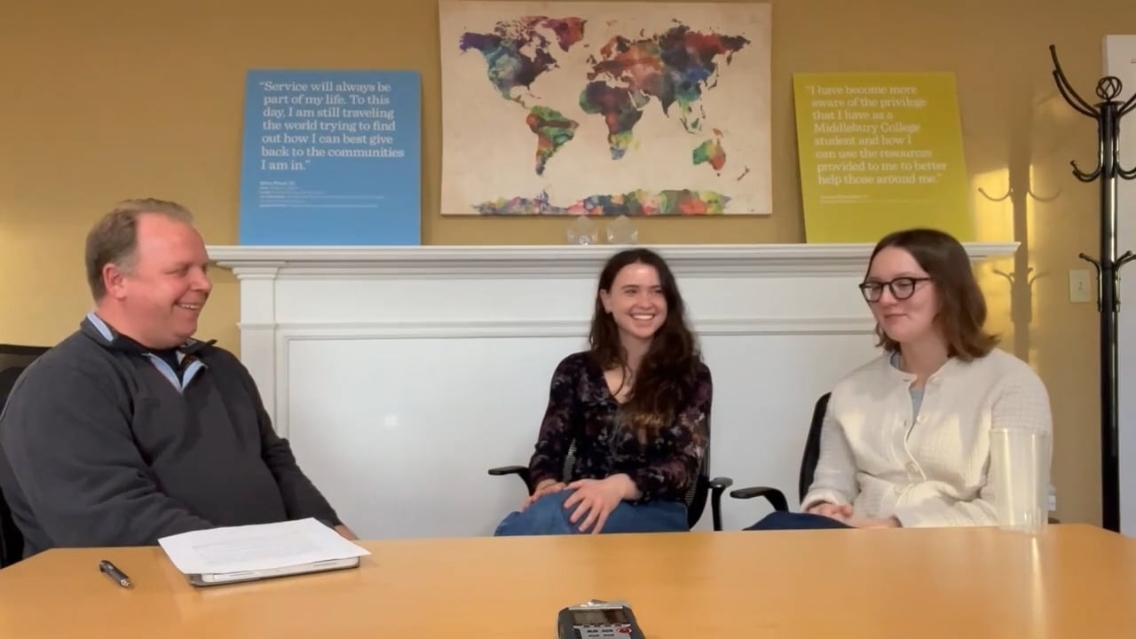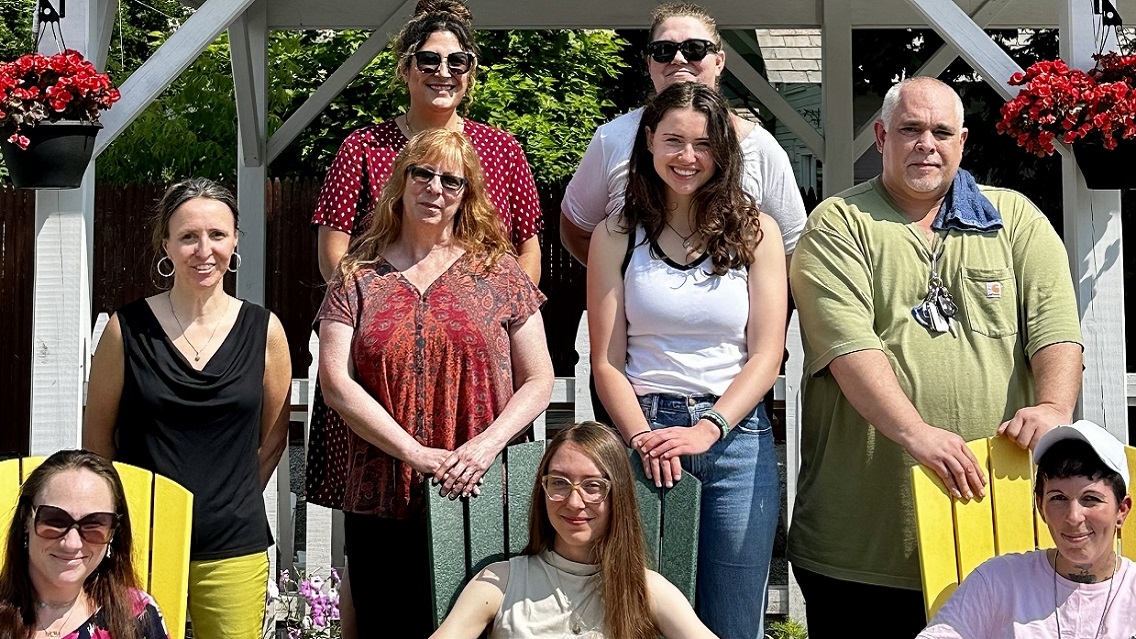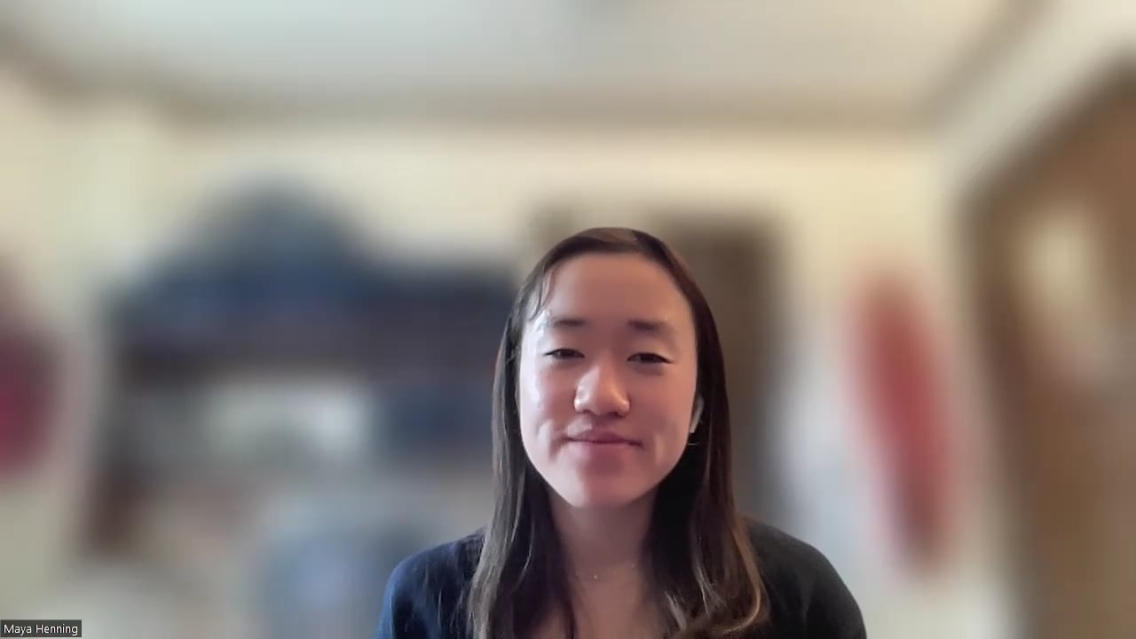Stories and Highlights
Read these stories and testimonials from some of the students, alumni, faculty, and community partners involved in community engagement with the CCE.
Alumni Stories
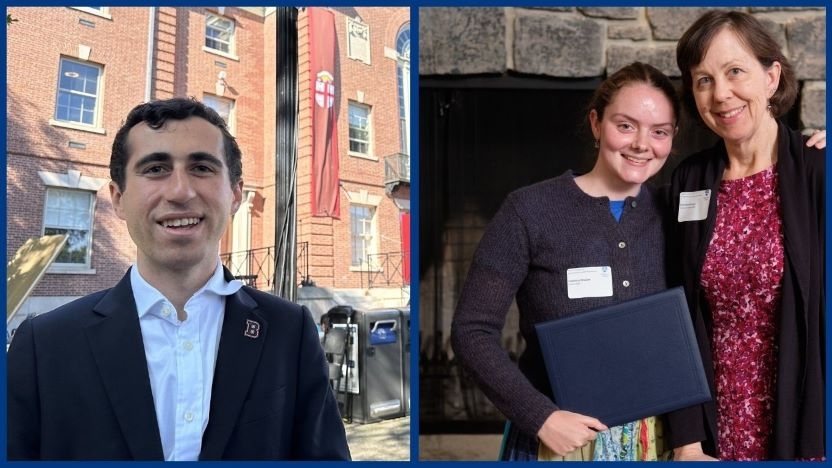
Community-Engagement Pathways: Middlebury Alumni Connect in the Field of Public Health
Middlebury College students find community-engaged learning in varied and unique ways. Whether they are drawn to a particular social issue based on personal experience, their background, or discover the work through an academic course, no two paths into community engagement are alike. But along the way, these paths can and often do cross. This is the case with two Middlebury alumni turned colleagues, Benjamin “Benjy” Renton ’21 and Gabriella “Gabby” Chalker ’24, who now conduct research for Brown University’s School of Public Health.
Earlier this year, Renton, a research associate who works with Ashish K. Jha, Dean of Brown’s School of Public Health, was tasked with finding a research assistant to support two senior fellows undertaking global health work on biosecurity projects and policy in Washington, D.C. To find the right candidate who could start immediately, Renton contacted faculty members at Brown and other institutions, including his alma mater. His email to the Center for Careers and Internships at Middlebury quickly found its way to Pam Berenbaum, Professor of the Practice of Global Health, who recommended Gabby Chalker unequivocally.
“I never knew [Gabby] which was surprising because I honestly felt like we did a lot of the same things,” says Renton, reflecting on his time in college. His involvement with community engagement at Middlebury started with the Privilege & Poverty Academic Cluster. “I had taken some of the classes that were linked in the cluster. They were of interest to me. And then I sort of just kept going.” As a busy student majoring in International and Global Studies and writing for the student-run newspaper, Middlebury Campus, Renton kept up with community work during his sophomore year as a leader for a MiddView Trip, building homes for Habitat for Humanity. About halfway through his junior year, when his study-abroad trip in China abruptly ended due to Covid-19, Renton began leveraging his skills in journalism to share information about the growing pandemic. With a knack for synthesizing rapidly changing data and making it digestible through his Twitter and posts on his blog, Off the Silk Road, Renton grew a wide following that included educators, scientists, and policymakers beyond Middlebury and Vermont. In January of his senior year, he accepted an offer from Mike Pieciak, Vermont’s current State Treasurer and Vermont’s Commissioner of the Department of Financial Regulation at the time, to work on the state’s pandemic response team. “I just saw it as a really cool opportunity to be involved with the local community and certainly at a time that was very challenging for a lot of people.”
Elsewhere on campus, Chalker was only just beginning her college experience in 2020. As a first-year student, she enrolled in the Community-Connected Learning (CCL) Course offered through the Center for Community Engagement (CCE), which aims to develop students’ civic knowledge, skills, and identity by pairing them with community partners at local nonprofits to complete a semester-long, social change-oriented project. After taking the course, Chalker went on to be the Project Assistant (PA) for the CCL course for four semesters, supporting students on their course projects, holding presentations and discussions on course material during classes, and supervising projects from initial meeting to completion. Chalker regards the CCE as a home while she was at Middlebury: “I really did so many things with the CCE.”
Knowing that she wanted to pursue the field of public health, but with no standalone public health degree offered through the college, Chalker designed an independent major in health humanities with the support of her advisor, Pam Berebaum. Based on the field of medical humanities, Chalker’s major was much inspired by her work at the CCE, “the things that I had learned there… so much of it is central to the work of public health.” Chalker continued with experiential learning in her chosen field with several Cross-Cultural Community Engagement grants that supported grassroots work abroad with Global Health & Equity at Middlebury/GlobeMed’s partnership with a non-governmental organization (NGO) in Rwanda, and a cycling storytelling project on aging through Copenhagen and Stockholm. Her senior year, Chalker and Middlebury Alumna, Sophia Fatima ’24 were awarded a Projects for Peace grant to design, implement, and manage the Jakarta Youth Climate Leadership Camp, an environmental justice project that extended several months post-graduation. With these project-based experiences under her belt, Chalker stayed in the non-profit sector after graduation, working for a public health research NGO in Kathmandu. Soon after returning to the United States in early 2025, she was hired by Renton and began in her current position as a research assistant for two senior fellows who had worked for a previous presidential administration.
Chalker credits the PA training she received through the CCL course for teaching her the critical skills she uses in her current role. Relationship building, understanding one’s civic identity, and project management all come into play when convening meetings and gathering research. “We are really trying to focus on bipartisan leadership in global health. Understanding people with different perspectives is very relevant in that case because we are trying to work from commonalities and not the polarized differences.”
Renton, too, points to his college leadership experience for providing him with the communication skills that have translated to his position at Brown. “[B]eing able to write, I think, has been a huge part of what my Middlebury experience taught me, particularly in a role that I am doing now, which is very research-focused.” Renton spends a lot of his time preparing the dean for events, writing op-eds, speeches, and the like. “Being able to communicate your findings in a written way has been super important.”
It is worth noting that both Renton and Chalker believe their understanding of community engagement has evolved since college. While Renton sees communication about global health as a continuation of his undergraduate work, there is now a strategic component to his job that requires leveraging partnerships and connections to drive impact. “We’ve been thinking a lot about climate change. We’ve been thinking a lot about biosecurity and pandemic preparedness. [H]ow do we, in these times, engage with policymakers? How do we engage with people in that D.C. community? That’s something that I think we’re still trying to build up, but has been, in my mind, super exciting.”
For Chalker, the profound shift from grassroots organizing to working in a government space with some of the largest global health organizations has been eye-opening. “I am being exposed to the other side of the global health coin… From a grassroots perspective, we can often be very critical of these large power structures like the World Bank, because they aren’t perfect and they have a lot of flaws. [N]ow that I am on the other side of things… It’s giving me more of a nuanced perspective on how all of these things have to co-exist.” While Chalker says she ultimately doesn’t know where her career will lead, her position at Brown is equipping her with more tools for the work ahead, which she believes will orient back towards the grassroots space: “I’ve always known that I’ve wanted to blend academia and research with on-the-ground community work, community-led solutions, community-led policy.”
While their pathways never overlapped during their time at Middlebury, Renton and Chalker’s gravitation towards community engagement and leadership during those undergraduate years has squarely connected them professionally. Their shared commitment to advancing global health by bridging academia with civic life and public engagement is a testament to the impact of community-engaged learning at Middlebury College and the importance of providing students with a wide variety of real-world experiences to best prepare them for their future careers.
Academic-Community Connections
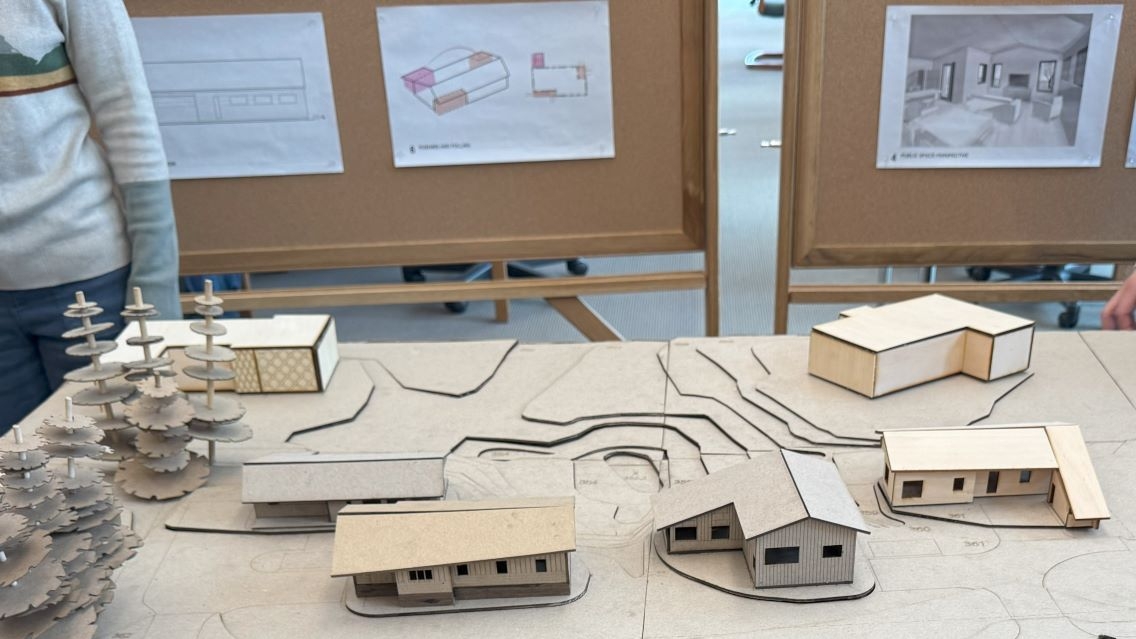
Developing Skills while Building Affordable Homes through a Middlebury College & Community Partnership
McCardell Bicentennial Hall was buzzing on Friday, April 11th, when Middlebury College students from across disciplines showcased their research at the annual Spring Symposium. Among them, a small group of architectural students presented renderings, technical drawings, and models for a Habitat for Humanity house, just one step in a year-long design process that will ultimately result in a real home for a family in Addison County.
This is not the first student-designed house plan to come from the academic-community partnership between Habitat for Humanity of Addison County, Middlebury College Architectural Studies, and McLeod Architects. The collaboration began in 2017, when Habitat for Humanity volunteer and Middlebury alumnus Ashley Caldwell ’70 approached Associate Professor John McLeod, founder of Middlebury-based McLeod Architects, with the idea of having college students design Habitat homes. McLeod considered the proposal, “I said, I just have one caveat… it has to be a true design experience. It can’t be playtime or pretend architecting where we just spit out cookie-cutter stuff.” Caldwell agreed, as did the college administration, which fully backed the course and provided robust support. Now, seven years later, the partnership underpinning the Habitat Design Studio is going strong, giving students an opportunity for hands-on learning while bringing good design to affordable housing. “We’re designing the 11th house,” says McLeod, “[the Habitat homes] have won design awards, they’ve been published, while also being some of the most energy-efficient housing stock being built in Vermont and serving the needs of some well-deserving families in our community.”
Mica Bodkins ’26, an Architectural Studies and Environmental Studies major currently participating in the studio, was among the exhibitors at the Spring Symposium. Bodkins has been part of the project since the conceptual phase began in the fall. After taking Introduction to Architectural Design and Intermediate Architectural Design, she was drawn to the opportunity because of the unique connections to the Middlebury community embedded in the course: “Having a real-world experience, especially at a liberal arts college, is really special and something that students, even at more technical schools, don’t get the opportunity to do.”
The first semester of the Design Studio includes between 12 to 14 students, while the class size for the spring semester is half that. The smaller group in the spring term learns to use a high-powered professional software called Revit to draw and document the building design, a time-intensive undertaking reserved for only those students who are wholly committed to the experience and its results. “These guys are basically practicing architecture–under the guidance of a licensed architect, of course–without having gone to a professional architecture school, much less gotten licensed,” says McLeod, “[It] is a very hands-on process and when it gets to that level of sophistication and advancement, it just can’t happen with one professor and 12 students.” The reduction in students from term to term reflects the high level of professor-student interaction and the degree of coordination required among students that would otherwise not be feasible with a larger group.
Working collaboratively in the Habitat Design Studio is a key departure from the hypothetical, individualized projects students complete in their prerequisite architecture courses. Bodkins recognizes that being a part of a team can be challenging for some students, but that aspect of this experience is something she finds most valuable. “I think people have different skills and that’s what makes design really cool…Your idea is not always going to fly with everyone else, even if you think it’s great, and that’s part of compromising. And I think we’ve come to something really beautiful, all together.”
Bodkins looks forward to seeing their work come together in the construction phase, slated to start in May 2026, the same month as her graduation. If the timing works out, she plans to join the building crew. “I think that’s one thing that’s super important in architecture that’s been kind of lost, is having that connection between the design process and actual constructability,” says Bodkins. “I’m excited to stay and work with the Habitat volunteers.”
This awareness of the importance of community engagement is not only foundational to the Habitat Design Studio experience, but it is also part of McLeod’s overall approach to architecture outside of the classroom: that good design should be accessible to everyone. It’s called Architecture for All. “And yes,” explains McLeod, “that includes privileged people, but it also means families who can’t afford market rate housing, and even chickens who need a house, too,” referring to some chicken coops that McLeod Architects and a team of students designed and built for a school in Maine. ”It’s the ethos of our firm, and it’s the ethos, I think, of Middlebury Architectural Studies, most exemplified in the Habitat program…. It’s this idea of serving all, serving the community, serving society.” In the spring of 2024, McLeod organized a symposium at the college by the same name, bringing together internationally and locally recognized architects, students, and the general public for five days of presentations and events centered around the practice of architecture for the betterment of society.
Understanding how to make architecture accessible to all people, no matter their socio-economic status, has made a lasting impact on Bodkins. “We’re going against that narrative and showing that architecture can be used for public buildings and lower-income housing.” Working with Habitat, she reflects, has opened her eyes to another realm of the discipline and her understanding of who architecture is for and the needs it can address.
While the technical skills learned through participation in the Habitat Design Studio were abundantly evident from the display at Bicentennial Hall, the renderings and models represented just a fraction of what students gained from the project. From making construction documents to meeting building codes, acquiring permits, and presenting to clients, to staying on schedule and budget, all while collaborating with a design team, they acquired a depth of knowledge and insight into the profession of architecture only a hands-on, real-life experience could offer. For the client, Habitat for Humanity of Addison County, the collaboration provides more than just another blueprint for a home; it expands the scope of the organization’s mission and vision to do good for the community. Says McLeod, “Not only are they delivering affordable housing, but they’re participating in the education of the next generation.”
Community Partner Spotlight
The Center for Community Engagement is fortunate to partner with a network of over 200 organizations, both locally and internationally. This Q&A series highlights the work of our collaborators and what successful partnerships through the CCE can look like.
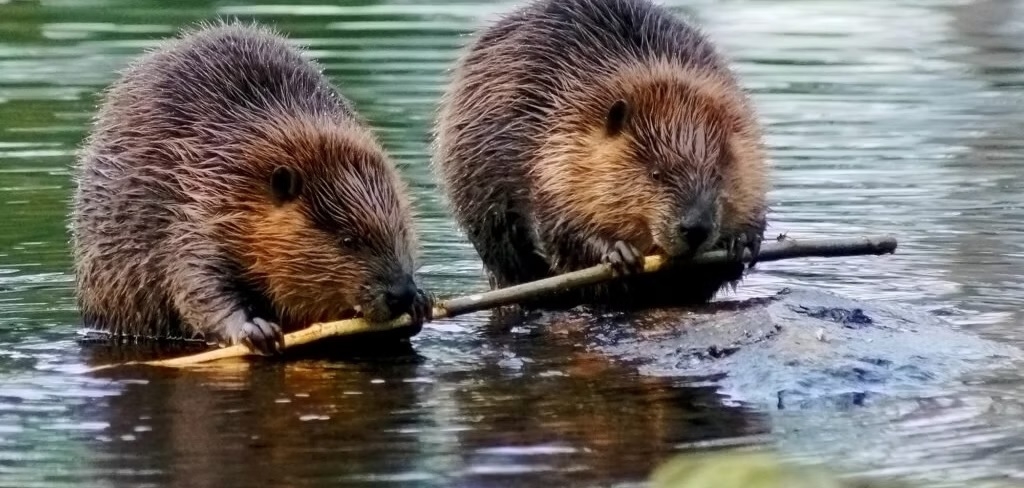
The Vermont Beaver Association began in 2024 when a small group of beaver enthusiasts organized around the need to raise awareness of the ecosystem services beavers can provide in Vermont landscapes. In the spring of 2024, the Association partnered with Donovan Wood ’24, a student in the CCE’s Community-Connected Learning Course, to develop a website.
We sat down with our Community Partner, Beverly Soychak, co-founder of the Vermont Beaver Association, to talk about the collaboration, the positive impacts the website had on the association, and what made the partnership successful.
Q: Can you give some background on the website project and how it came about?
A: After creating the Vermont Beaver Association, we were like, how are we going to get people involved? How are we going to get people to find us? What are we going to do? So we started a working group - we’re up to 25 different individuals across the state of Vermont, consisting of people from land trust organizations, river conservation, ecologists, biologists, and infrastructure specialists, and colleges. I mean, the list just goes on and on and on. It’s been really wonderful, but we had to have a way to connect everything and display all of the work. As a startup nonprofit, we never would’ve been able to afford a website. We were calling around getting quotes from $8,000 to $10,000.
It’s really expensive and we wanted it done right. We didn’t want something that was just hacked together because we were hoping that this stays around and that it’s a channel for everybody to go to. So the partnership that we formed with [the CCE] was just perfect timing, and we gave the student that we worked with free rein to do whatever he wanted.
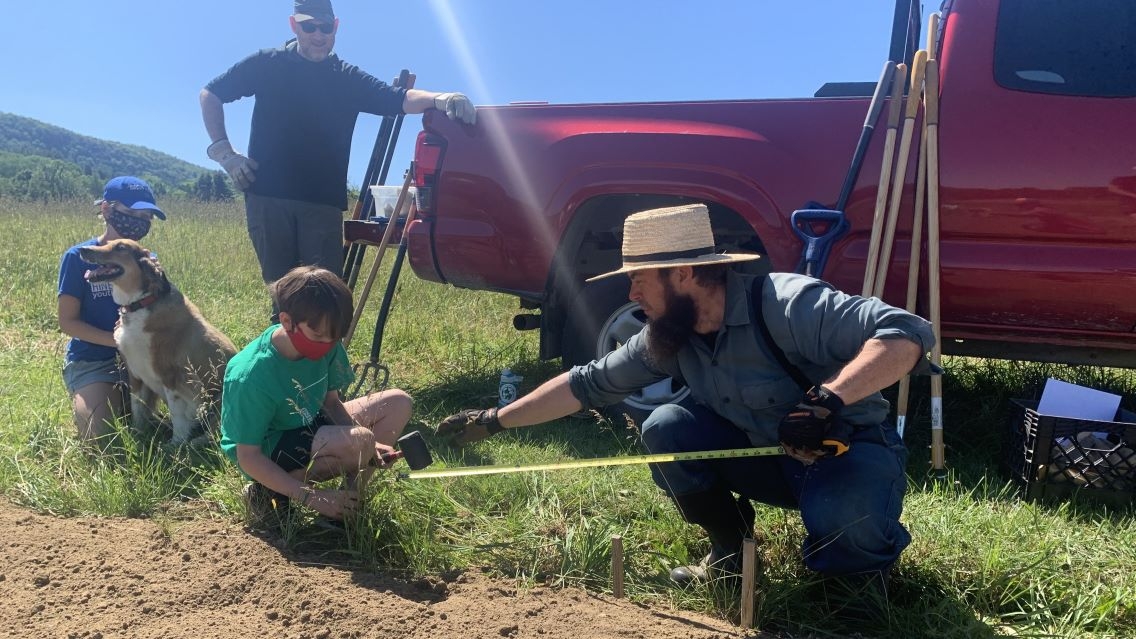
New Community Project
At New Community Project’s (NCP) Sustainable Living Center in Starksboro, Vermont, a small but dedicated team of staff and many volunteers focus their efforts on finding local, sustainable solutions to address rural poverty, food insecurity, and energy poverty within the community.
Read the Q&A with Pete Antos-Ketcham, the coordinator of NCPs the Starksboro Center.
Community Engagement Organizations
The CCE supports 15+ student organizations that contribute to the public good. Read student leader reflections on how community engagement work has impacted their lives and the lives of others.
Charter House Coalition Student Organization.
The Charter House Coalition Student Organization directly supports the Charter House Coalition (CHC), a local non-profit that provides shelter, nutritious meals, and friendly faces to those in Middlebury who need assistance.
Saturday dinners at Charter House have truly been one of the highlights of my time at Middlebury. Every week, I’m reminded of the incredible sense of community here—among the dedicated Charter House staff, our wonderful volunteers, and the residents who make each dinner memorable. - H.S. ’25
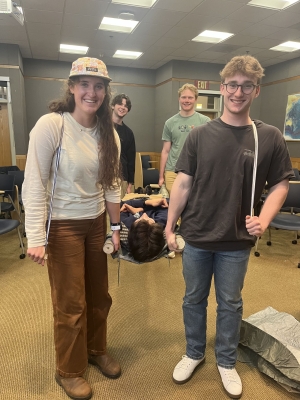
Middlebury First Responders
Middlebury First Responders (MFR) is for students interested in emergency services or who are employed as first responders.
EMS has profoundly shaped who I am, but I’ve only been able to continue such tough work because of the support of my coworkers and mentors. I hope MFR can provide the same foundation for others… my ideal is to also create a space where people feel camaraderie and support. - W.S. ’24.5
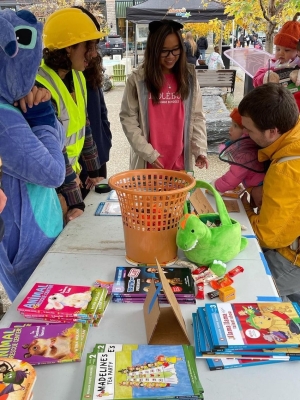
Page One Literacy Project
Page One is on a mission to spread literacy and creativity and foster a love of reading in local elementary school children.
Page One is a way to share my love of reading and books with kids, an activity that I find extremely fulfilling. Reading brought me so much happiness and joy as a child. I also love the way in which Page One connects me to the broader Middlebury/Vermont community in a way that I otherwise would not be able to do. - K.S. ’26
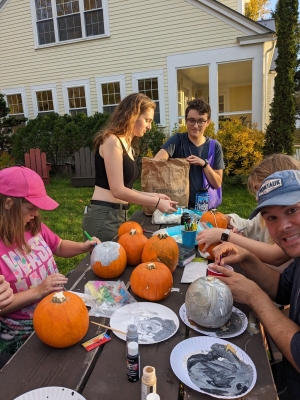
Yellow House Community Club
Yellow House Community Club (YHCC) partners with the Yellow House Community, a residence for adults with developmental and intellectual disabilities.
I chose to join Yellow House Community Club because spending time with the Yellow House residents always brightens my day and uplifts my spirit. They are some of the most loving, kind, and compassionate people I have had the privilege to form a connection with. Through our YHCC activities, we create moments of genuine connection that remind me of the power of community and shared joy. -E. N. ’25
The Clifford Symposium
The 2024 Clifford Symposium: Student and Faculty Reflection
Matt Lawrence, Associate Professor of Sociology and Academic Director of Privilege & Poverty (P&P) at Middlebury College, facilitates a conversation with former P&P interns Ellie Cady ’25.5 and Freddi Mitchell ’25 about their involvement in the 2024 Clifford Symposium on Home, Housing and Belonging in Middlebury and Beyond.
ML:
Hi, Freddi. Hi, Ellie. It’s good to see you again. We were spending a lot of time together over first few weeks of the semester and over the last year, really, for the, the 2024 Clifford Symposium. So it’s nice to have a chance to reconnect and to debrief and work reflect on what that experience was like.
My name is Matt Lawrence. I’m the Academic Director of the Privilege and Poverty Cluster at Middlebury, and I also teach in the sociology department. Do you each want to introduce yourselves?
EC:
Sure. Hello, I’m Ellie Cady. I’m a Senior Fab, and I’m studying psychology with minors in Global Health and Spanish.
FM:
Yeah. And I’m Freddie Mitchell. I’m a senior studying international politics and economics with a minor in French.
ML:
And we were three of the organizers for the 2024 Clifford Symposium at Middlebury it was titled to Home Housing and Belonging and Middlebury and Beyond. but we had some other organizers as well. So we were joined by Jason Duquette-Hoffman, who’s an assistant director at the Center for Community Engagement. Professor James Davis from the Department of Religion. Professor Erin Sassin from the Department of Art and sorry, the Department of Art History and Architecture and Professor Pam Berenbaum from the Global Health Department and the Global Health Program. And so we’re really focused today on your role as students in the development and the planning of the symposium.
Why don’t we talk a bit even before we get into speaking about the symposium itself just about how we all connected the ways that the Privilege and Poverty cluster in particular brought us together. How did you all become involved in the P&P cluster?
EC:
Yeah, so I had attended a few different events that was hosted at the, that were hosted at the CCE before becoming involved with the Privilege and Poverty cluster. So I was able to talk to a lot of students and former interns who have worked at a variety of different nonprofits in Addison County and had really enjoyed their experiences. And I also really liked that it had a capstone aspect to it. So it’s not just the summer internship experiential learning piece that you are able
to receive, but also you have to take a few classes that will give you a better understanding of what you’re experiencing during your summer internship. And I really like that aspect of it. Oh,
FM:
And so I hadn’t been involved in the P&P academic cluster before during my internship,
but I ultimately thought the internship was something that I would be interested in just because of the way to gain experience sort of in the field of public service by working directly one-on-one with individuals in the community. And I also had thought about a lot about going to school in Addison County in Vermont, and feeling a little bit detached from the local community. And I thought it would be a great way to get to know Middlebury a little bit more.
ML:
That’s great. I mean, that sounds like why we do in P&P especially this idea of experiential learning being really a centerpiece of a Middlebury education, that you take some classes related to some interests. You do an internship and then you come back and share what you did and learned during that internship with the rest of the community. And that, that community connection is such a big part of it. We don’t have a major or minor in Addison County Studies. So, you know, those students are trying to make those connections and understand this place.
Where you’re living for four years or maybe longer, embedding that in some kind of service opportunities. That is really what we are trying to do in P&P and what we’re trying to do throughout the Center for Community Engagement.
So the Clifford Symposium focused on this question of housing and housing affordability, housing accessibility, now something that both of you were, working on during your internships. What did you do for your internships?
EC:
So I was placed at the Charter House, which is a low-barrier homeless shelter in town. So there are a lot of individuals who were experiencing housing insecurity, substance use disorders and link other issues. And I was able to have a lot of sit-down conversations with them and hear about their own individualized stories of how they came to be at the Charter House and what their futures or what they hope their futures would look like. I also was able to work directly with the director of the Charter House and hear more about some of her goals for Addison County and some of the challenges that many of the residents and guests at the Charter House face.
FM:
Yeah, so similar to Ellie was working a lot on housing over the summer. I was working with Addison Housing Works and Addison Housing Works is a local non-profit dedicated to owning and maintaining affordable housing in Addison County. So they as an organization provide many of the people who have passed through the Charter House or John Graham shelter with a permanent home. And so I got to learn throughout the summer about the different resources available that fund affordable housing one then being the low income housing tax credit. And I did a lot of research for that on how that money was funneling down to the state of Vermont how it was, how the criteria that are set in different states in New England and how they compare to the state of Vermont and maybe what are the roadblocks to affordable housing development.
And I also want to interact a bit with their different clients. Definitely a little less than Ellie did. But I think that that is just the nature of Addison Housing Works as an organization and their role as housing developer rather than a service provider. and getting to see that and making the connection cause we lived together over the summer between our experiences and how services, but also providing permanent housing are so intertwined was definitely a major theme that came out.
ML:
Was housing an issue that you had come across in classes before the internship? Was it an issue that was interesting to you before the internship?
EC:
Yes and no. In your class Inequalities of the American Dream, which I, I think I took the year before I had my summer internship. We were introduced to or we started reading the book Evicted by Matthew Desmond. And that’s based in Milwaukee, which is my hometown. And it was the first introduction that I had into what some of the real challenges that people are facing who are housing insecure and why they became housing insecure. I had grown up, I have grown up in Milwaukee, and so I never really thought more about why someone became housing insecure. I would just drive through some of the neighborhoods and have my own assumptions. And I think that really changed how I thought about people who were getting evicted or who were experiencing homelessness. But I don’t think I became very involved with the issue of housing and still having the experience of the Charter House and hearing about how there are so many individuals there that have full-time jobs who are making more than the minimum wage but still could not get housing who still had been at the Charter House for one or two years, even if they were actively looking for housing. And that part I just could not wrap my head around. And you know, through many conversations with the guests at Charter House and with the director and with our class reflection discussions, you know, it became so apparent that these ages all were revolved around the lack of housing in Addison County and beyond. You know?
FM:
Yeah. I definitely felt like in my classes housing, it wasn’t necessarily the central theme,
and that’s just the nature of the fact that so many issues are, exist in this world. And a lot of our class at Middlebury are very theoretical and can apply to the multitude of experiences that people have, but in a, I’m an IP major So we talk a lot about the 2008 global financial crisis, and I think that’s where I became the most knowledgeable about housing,but I sort of saw it as this very, like, commodified thing. and I think it’s important to see it in yes. in an academic light like that, but also see it in the real world as a, you know, a home for somebody, a sense of belonging what it is on an individual level and not what it is in the sense of you know, creating a, like mortgage backed securities and like, you know, financial contagion and a whole mess. So definitely like I saw a difference between what I learned in my internship and what, what has gone on in my classes.
ML:
So, you both had some understanding of the centrality of housing to questions of social and economic inequality. Mm-hmm. Right. Um, both on both the local scale and on perhaps a global scale.And even with the connections to the Desmond piece. Right. One of the things that Matthew Desmond says in Evicted is that we have really failed to appreciate how important housing instability and housing insecurity are to the creation of poverty that housing, uh, instability is both a cause and an effect of poverty and that is something that came up quite a bit in our summer reflections. Right. So you mentioned that you were living together for that summer, but, uh, we also had several other interns, in our, in our local internship program, uh, as well as several interns in our, in our national program. and one of the things that I like most about working with Privilege and Poverty is the chance every week during the summer to bring everybody together to talk about how your experiences are going. And you’re exactly right then with your cohort housing kept coming up. So whether students were working on food insecurity issues or when they’re working on domestic violence issues, whether they’re working on issues related to migrant health, housing was the thing that you all kept talking about. Uh, and that’s why, Ellie or Freddie in particular, I remembered that one day that we stayed a little after one of those reflections and you said, I wanna figure out some way to share the conversations that we’ve been having with the rest of the campus. That’s really the moment that I think ofas the origin story of the Clifford Symposium.
Why was it so important to you to extend the conversations that we were having as a P&P cohort to extend into the experiences that you were having in your internship with the rest of the campus community?
FM:
I think it was important because Privilege and Poverty in my internship with Addison Housing Works allowed me to understand and not shy away from the fact that there is a housing crisis and immense housing insecurity going on in Addison County which is a, a very rural place, a place that a lot of students don’t necessarily connect with as what their home town looks like, or you know, where they call home. And so I thought that it would be a good idea to, you know, find a way to make more students aware of what was going on and how it would, how it related to their lives. I think the college can sometimes be very separated from the town, even though we have things like the Privilege and Poverty program this is one of, you know, not very many ways to get involved, and it feels hard to get involved when you’re just, you know, a student trying to get through college. And so I felt like having an event of that sort would allow people to connect what they’re learning in their classes with what’s going on in the community sort of bring Middlebury back to, um, the place that it is in, and not just wrapped up in the global, world, which we seem to be wrapped up in, in a lot of our classes but make connections between what we see as the world’s most challenging problems, and how they might be going on in our own backyard.
ML:
For those of us who know you it is probably not surprising that you took on the most ambitious version of bringing these ideas back to campus. And some of the other ideas that we knew we discussed over the summer were, were smaller in scale. We talked about just doing a library exhibit or a library exhibit. We talked about maybe doing a session during the spring student, we talked about maybe having some kind of like takeover in different classes on a day where we asked faculty for the first five minutes of their classes to talk about affordable housing and housing instability. So there were different ideas floating around. But there was something about this ambitious three day symposium That’s the, academic kickoff for the school year that felt like it really captured your imaginations. Once you knew that it was a possibility of doing a Clifford why were you, why were you interested in joining on it?
EC:
Yeah. I think especially after my experience at the Charter House and going through the, we had a reflective class, a half credit class in the fall that following fall. I felt like I, I wanted to do something. We had been having conversations all summer. I’d seen these experiences that were happening in our own backyard, and I didn’t know exactly what I could do as a student at Middlebury College. And so when Freddie began talking about an idea of the symposium, I was very interested, one, as Freddie had mentioned, I think students were already talking about housing in some kind of way, and how it was affecting our Middlebury community mainly being that, the Grill and dining hall were having different closures because they didn’t have enough staff to support their hours that they wanted to have. And so I think students already felt, I would say fairly passionate about this, but weren’t specifically saying it was a housing problem. And so I felt like this was an issue that will really engage a lot of students, but also professors and community members in a way that I’m not sure any other issue could. And so I was really excited about it and I wanted to, to become involved
ML:
The way that we convinced other folks on campus that this was gonna be an, a potential issue that students will care about, that staff will care about, faculty will care about that would engage community members off campus was for the proposal process. So unlike some of those other things that we were thinking about as ways to, to connect those conversations to the rest of campus the Clifford Symposium required a full proposal where we had to convince members of the administration that both that we could do this work and that this was important work.
So let’s go back to the development of the proposal. What were the, what were the key things that we were putting into the proposal as we, as we collaborated on it that were really important to you?
FM:
I think just I mentioned a little bit before but connecting it back to why are we at Middlebury and why are we learning about things that we’re learning about? And what are the subjects that Middlebury students care about and how are they connected to this issue of a housing crisis and a sense of home? And I felt like in the proposal, especially because it started off more being this housing idea we needed to find a way to sort of bring that back to like how that intersects with all different disciplines. So housing is not gonna be brought up in your hard science classes, you know, explicitly or in your dance class, but what every student has in common is this idea of a sense of belonging. Um, and so I felt like that was a very important part to add into the proposal, was this idea of a sense of belonging and how that is intertwined with you know, the environmental movement, the migration crisis that our nation is going through and just our lives as students living on a college campus, a residential campus, and having different Communities that we call home.
EC:
Yeah. I think it also, like you were saying about for this multidisciplinary engagement with so many students, and I, I think it’s a issue that students from many different backgrounds
and interests can collaborate on and can and feel like they have some sort of piece or some sort of contribution that they can make to it based on their own experiences. I also think that we wanted to include community voices, and so, you know, we wanted to have a symposium where it wasn’t just an academic piece, but also bring in, you know, the real lived experiences of individuals who were affected by, and are affected by the housing crisis. and I think we did a pretty good job at intertwining the two.
ML:
Yeah. Definitely. I think that, well, you, that that moment when we figured out that it couldn’t be called housing, had to be called home. That was a big day. Yeah. Because I think it really allowed us to move from this being a P&P symposium, to P&P opening a campus conversation. and really finding some way that everybody would feel, or many more people would feel like they belonged. Yeah. To double down on that idea of belonging, and community involvement. And I really do recall some of those conversations, both in person and our many Google docs where, you, you kept reminding the faculty on the organizing committee that like, this can’t just be academic. This can’t just be theoretical. Mm-hmm. And I think especially like when I… what I kept thinking about the Clifford is the opening academic program of the year. Uh, there was some way there was supposed to be that intellectual kick-off Yeah. That I wanted that theoretical piece. Yeah. but that, I think one of the things that P&P shows, the experiential learning shows at the Center for Community Engagement shows, is that real stories of people’s lives can be the entry point to theoretical conversations. It doesn’t have to go that other way. And so I think that was a really great contribution that you were making to our organizing planning committee.
What were some of the specific events as we started putting together this calendar of three days of programs, what were some of the specific events that you thought would be really appealing to students?
EC:
I would say, I would say some of the panel discussions would be really interesting for students to be able to connect with policy makers in the state of Vermont, um, professors and just so many different individuals that have some you know, involvement with this issue would be really interesting for students. And I think we saw that in the two panels that we had on Friday afternoon. There was a lot of student engagement. Just watching some of these students vigorously take their notes during some of these panels was really encouraging to see. And having students come up to me after asking for the presentation slides and, um, you know, really feeling like they, they learned something from these panels.And I, I also was really encouraged to hear some of the very thought provoking questions that students asked. And they asked of these policy makers, which was a really cool space that we had created. And so I think the panels did a really good job. Not that that wasn’t, there were other great events that happened during the symposium, but I think the panels did really well.
FM:
Oh, I definitely agree about the panels but also the specific panelists and speakers that were invited by the planning committee. I think that those were some pretty great decisions, made especially Dr. Davarian Baldwin definitely I think allowed students to really think about the context that we live in as Middlebury students in a town where the college is the, I’m pretty sure it’s the largest employer in Town, um, second to the hospital. But beyond that, I really, what I really enjoyed was this, the dinner. The closing dinner that sort of allowed people to, we came off of the two panels that day and people had gotten a lot of information but they allowed people, they allowed me specifically, but I think others to, to connect with those that were coming from different places in the whole realm. So I was at a table, um, with some local leaders, a leader, Kevin Chu, who he leads the Vermont Futures Project, but I was also at the table with someone from Vermont Humanities, and then a couple of Middlebury professors and, you know, another Middlebury students. So hearing everybody’s perspective on this, was, was really interesting. ‘cause I felt like that can be a lot of polarization and having conversations together over dinner and talking about Gather and connecting it back to, you know, the Vermont stories and, was really powerful.
ML:
There was a moment because we were running around like wild for two days, before that dinner. And I, I remember also a moment when we just sat down at that dinner and I think Professor Davis just kind of called the room to order and set a tone for that event that brought the reflection that we had done during the summer. Yeah, back to the campus. I think that’s, that was the goal. Like, there was this moment where I just thought during that dinner, like, wow, we, we pulled it off. Yeah. I think we all, we all came together and did this thing that several months before just seems like a faint possibility to be honest. And one of the things that I keep hearing from people who were at that dinner, from people who were at the panel, from people who were at events throughout the weekend is that student involvement in this Clifford Symposium student engagement in this Clifford Symposium was one of the big reasons why it was so successful. You talked a bit about why you think student engagement and why this issue of housing in particular was something that would appeal to students. But what other ideas or advice do you have thinking back now, about why student engagement was so high this time?
EC:
I think that students were really involved because many students care about Middlebury and the community and the institution, and they want to see Middlebury College doing something. And I think what we did a really great job with with the symposium is we struck a balance between not blaming the school for their inaction or for potential actions that were harmful against the community, but also providing information on what the school could also be doing. And I think that really excited a lot of students because it, it gave hope to a lot of students that they, that they wanted to do something and and two, that their institution could be doing something and also that their institution was already doing something. So I thought we did a really good job at demonstrating that balance. And I think, you know, there’s a lot of students who were really excited to become a little bit more connected with the Middlebury community in that way whether that be through some sort of student engagement club that volunteers in the community or continuing these conversations.
FM:
I think also if you compare this symposium to symposiums in years past sometimes the symposium is seen too, as like too intellectual in a lot of ways and too academic and I think it turns some students off to it because, you know, it usually happens towards the end of the week and, you know, everybody’s going through their classes and some of these topics don’t feel very real to their daily lives. But we, we formulated an idea of the three of us and the rest of the planning committee that was applicable to everybody. Just the idea of belonging and home and housing, it’s applicable to every person on this planet. And so I think that that had a lot of to do with it, but I also think Middlebury students are pretty active and care a lot about a lot of issues. And I think we did a good a job of, you know, catering to the student mood of you know, being a little bit more active and, wanting to be out there in community these days and wanting to take action on issues.
ML:
I also remember the ways that you made sure that there were gonna be multiple ways that students could be involved. So as we were putting together the proposal, it wasn’t, you know, we had two panels Like, and two pretty academic panels. But we also had a breakfast at the Charter House Club organized, I remember you being really involved with that. We made sure that the SGA knew about a lot of the events, you were really involved with that. You both collaborated very impressively on the exhibits that were up in the library and in Bihall. So even just physical entry points into the content if you’re on the science side of campus, or if you’re in the data library, you’re going to know, some of the key fact about housing based on the posters that you had, you’re gonna hear some of those individual voices you want to bring in. So even just thinking about how, you know, what are the, what are the ways that students are gonna be navigating this space during the week leading up to it and then how can we take advantage of that to be able to recruit them to the events? Your perspectives on those kinds of issues were I think really critical, as well.
So one of the things that I was struck by during the symposium, you know, I kind of went into it expecting that a lot of the panelists were gonna say, we’re not doing enough, right? Mm-hmm. We have this housing crisis and like, it’s just something that we finally need to deal with. And actually, what a lot of them said was, we’re doing a lot. There are so many things in Addison County in the state of Vermont that we’re trying to do, to combat housing instability and housing insecurity and housing affordability. But there’s still a lot more to when you think about your next steps. But when you think about the next steps that other students can take what do you want to be thinking?
EC:
You know, I, we had this conversation the other day at dinner that we went to with some other P&P interns who had also helped us out with the symposium. And at least a common theme that came up for me was collaboration. And I think we can put our best foot forward as students if we collaborate across different student organizations instead of, I know there was an idea that floated around of creating a new club, but I think it would be more beneficial to collaborate across groups that are already working in the community, whether that be the Charter House Club or Midd Volunteers. Um, there are many that already do really incredible and crucial work for the Middlebury community that could partner together and I think would be a stronger force. and I think also just recognizing some, some of the, the actions and some of the jobs that have already been, excuse me, some of the work that has already been done, for the housing crisis. And there are so many people in the community that are doing so much like the direct service providers. And I think recognizing that is also really important. And I think we, we did a great job of that in the symposium.
FM:
I mean, something that my Privilege and Poverty internship showed me is there is I mean, Vermonters have a very positive outlook on issues, and it’s really, it’s really helpful in the way that they, come together as a community, There is a lot to be done still for just making sure that everybody has a home in the community. And it definitely has factored into what I care about. And also what I want to do with, you know, my life as, I’m a senior. And also I, I’m now doing a thesis about housing regimes in Europe. And that was not my planned trajectory freshman year. Yeah, I think definitely this whole symposium has made me think a lot about how are, how is what I’m going to do in the future related to helping others and that direct service component. And am I just going to forget about everything that I did during Middlebury? Am I going to bring that into my role? Am I going to stay in Vermont? Lots of questions. And honestly, it’s made me think a lot more about like, what am I gonna do? And like, become like a little bit more, I don’t really know. But I think that’s really, I, I’m kind of embracing that these days because I, I thought
before I came to Middlebury that I was gonna like go to college, become a lawyer, and do something related to government. And while I, I do think that I still want to do something in public service, I think that I’m just sort of going to embrace where I’m needed and where I can contribute. And the symposium and P&P internship really validated my want to help people and just feel involved.
ML:
That’s great. I know that we’ve been talking about the Clifford Symposium, specifically but hearing you both answer that question I was remembering back to both of your P&P interviews instead of any Clifford-specific things we talked about. Right. And so to, to hear the kind of full circle that you have notated with the P&P experience. Going back to those days when you were just thinking about whether this was something you wanted to do to now really being the examples of how P&P students but other students on Middlebury campus can do this in the future has been a real privilege for me to be able to work with you on. So thank you very much and best of luck with everything in the future.
EC:
Thank you. And thank you, Matt.
Privilege & Poverty
The Privilege & Poverty Academic Cluster (P&P) is a learning community that brings classrooms and communities together to address the causes and consequences of poverty and cultivate lifelong ethical participation in society. P&P students are placed in internships either locally in Addison County or nationally through the Shepherd Higher Education Consortium on Poverty (SHECP).
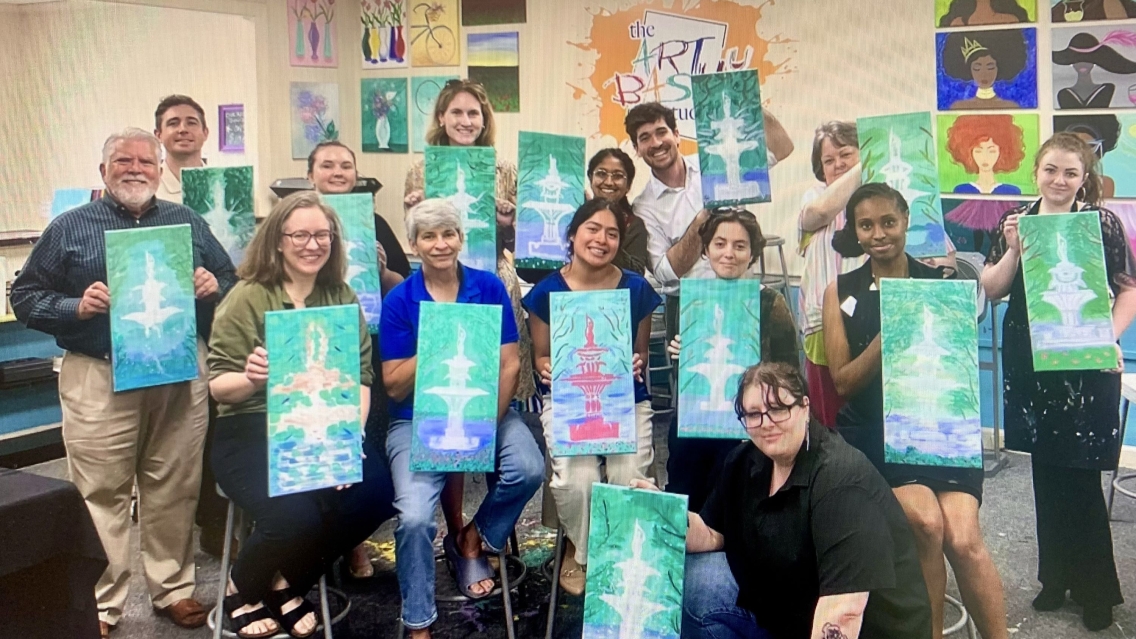
What students are saying about the P&P internship experience:
This internship was the most transformative two months of my life. Each day I learned something new about the law and its deep-rooted inequities, especially how it hurts marginalized communities in the South…The experience was especially impactful because it allowed me to apply my political science studies to real-world applications.
- P&P Intern with Georgia Legal Services Program
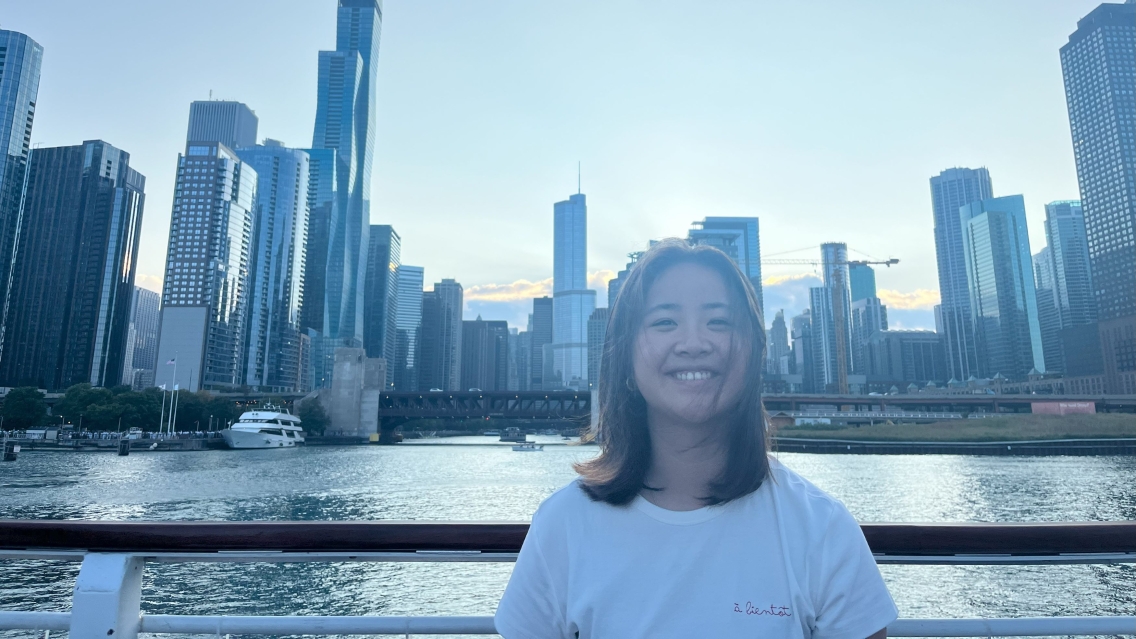
This summer, I had the opportunity to work as a teaching assistant in the afterschool program at Americana World Community Center in Louisville, Kentucky. My responsibilities included planning and facilitating educationally enriching activities for youths … and managing administrative tasks such as attendance tracking, course instruction, and field trip coordination. Reflecting on this internship, I believe it has significantly enhanced my understanding of poverty and immigration, and how these issues intersect with family education and youth development.
- P&P Intern with Americana World Community Center
Privilege & Poverty Intern Experience
Privilege & Poverty intern reflects on her summer internship with the Charter House.
Hello, my name is Ellie Katie, and I am an intern at the CC this fall. I also interned at the Privilege and Poverty Academic Cluster over the summer where I was placed at the Charter House, a low-barrier homeless shelter there. I worked on a variety of things, like supporting the shelter staff as well as the shelter guests. I also was able to sit in on some of the housing coalition meetings that different nonprofits across the county had, and this was really beneficial to gain a better understanding of some of the work that different nonprofits and service agencies are doing across the county to help support individuals who are housing insecure.
I am a psychology major with global health and Spanish minors, and this internship at the Charter House was something that I was initially interested in. I felt like it suited some of the skills that I already had, and I was in the process of exploring different potential careers that I might that I might have in the future. And that’s the beauty of the Privilege and poverty program because you were able to take some of the skills that you have and some of the interests that you have and find a job and an internship that really is suited for you. It really has provided a lot of guidance to me and what I want to do this fall. I’ve been able to continue some of that work as a CC intern and it connected me to so many different individuals across Addison County and in Middlebury. I felt much more connected to the town that I’m going to school in and even developed different relationships with people in the program.
When I first found out that I got the internship and I’d be in Middlebury, someone told me that living in Middlebury is during the summer is a magical time. And it really was. I was able to explore different areas of Vermont, get into open water, swimming. I’m a I used to swim and a swim team so I was able to start open water swimming at Lake Dunmore in the early mornings and explore different hiking trails and different swimming holes and also got to meet so many different people who are working here over the summer. There are so many people here over the summer, so it is wonderful. If that is something you’re worried about, don’t be. It has been such a lovely experience. It experience that I could not recommend it more. If you do have any questions about any part of the application process or even if you want to know more about the work of the Charter House where I worked over the summer, I created a comprehensive guide of the work that I did with different resources. I can pass it along if you want to review that before applying, but I’m also able to answer some more general questions as well. My email is e, o, c, a, d, y, and Middlebury dot edu. Again, don’t hesitate to reach out. I’d be happy to have a meeting or just answer some of your questions over email.
Good luck applying.
Newman Civic Fellows
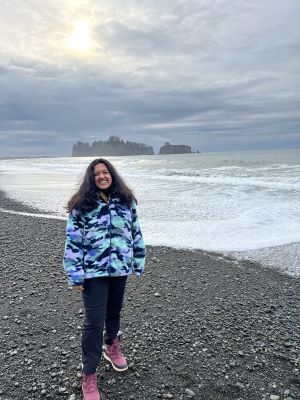
Shivapriya “Priya” Nair ’24
2023-2024 Newman Civic Fellow
Priya’s first experience with community engagement at Middlebury College was through the CCE’s Community Connected Learning course, where she helped run student groups at Mount Abraham Unified High School in Bristol, VT. Priya was also involved in Language in Motion, and was a Community Connected Project Assistant for an Environmental Studies course. She won a Public Service Leadership Award in 2022, and was named Middlebury College’s 2023-2024 Newman Civic Fellow.
“Throughout all these experiences, the real shining impact in my life was all the impressive and uplifting friends and mentors I was meeting. I had electrifying conversations about social, environmental, and health justice with people who became my best friends.”


